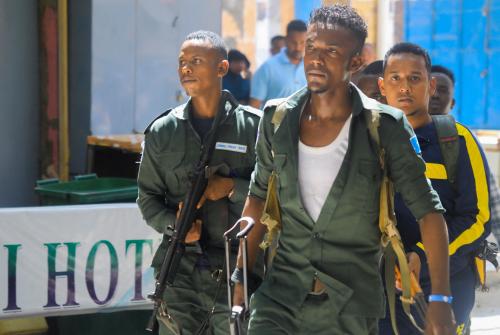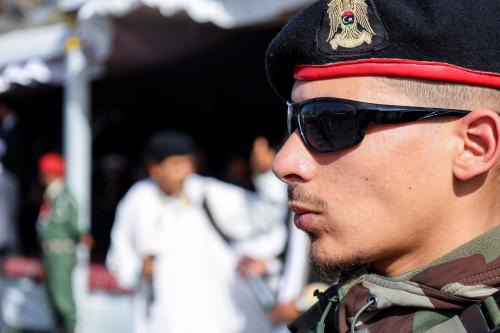
Editor’s Note: The blog posts in this series are adapted versions of speakers’ opening remarks from the June 24th Brookings Debate, which asked: “Should the U.S. put boots on the ground to fight ISIS?”
There is no greater obligation, no greater responsibility for a United States senator than deciding whether or not to commit U.S. men and women to fight and possibly die abroad. We in the Congress have attended far too many funerals in recent years for men and women who didn’t come back, and sat far too often with grieving families, to take this issue with anything but the utmost seriousness.
Part of that obligation is to be absolutely clear at the outset of any military operation on what our objective is. In the case of the Islamic State (or ISIS), that means we need to understand whether the U.S objective should be to eliminate every single ISIS fighter, or whether the objective is to degrade them to the point where they are no longer a threat to the United States.
I would argue that it is the latter rather than the former. Completely eliminating ISIS would require hundreds of thousands of American troops in Iraq and Syria. Even were the United States willing to make such a commitment, we would need to establish that the insertion of American troops would get us closer to the defeat of ISIS and that there is no other way to achieve that objective. Because the use of American troops creates the prospect that young Americans fighting for us in distant lands could die, that option should always be the last resort.
Sending U.S. troops in large numbers to fight ISIS does not meet either of those requirements for three basic reasons:
First, I don’t believe in the feasibility of the mission. Now, if the mission is just putting in enough troops to assist and train the Iraqis, then we have 10 years of experience to tell us that we are not very good at that. If 100,000 American troops on an average annual basis couldn’t train the Iraqi military to the point that they wouldn’t run from ISIS when they marched on places like Mosul, how are a couple of thousand additional American troops going to be able to correct for the mistakes of a decade?
If, by contrast, one believes that the U.S. role there should be to combat ISIS directly, then there is nothing about the last 10 years that tells you that we can accomplish that mission either. Certainly, if the United States put 100,000 or 200,000 troops into Iraq and Syria, we might be able to “win” for the period of time that we’re there. But that presence has all sorts of other side-effects that run counter to long-term American interests. The intelligence community tells us that when there are large numbers of U.S. troops in the Middle East, they become the cause celebre for the international terrorist movement. There could be no greater gift to ISIS’ global recruitment efforts than putting tens of thousands of more American troops in the Middle East. ISIS will certainly ensure that the word gets out as they seek recruits to bolster their ranks.
Second, I’d argue that putting combat troops into Iraq or Syria to fight ISIS frustrates rather than advances our most important goal there, which is political reconciliation. Currently, ISIS thrives in a political and economic vacuum, not a military vacuum. So long as Iraqi Prime Minister Haider al-Abadi has U.S. troops to rely on to keep ISIS at bay and to keep them out of Baghdad, then there is no pressure for him to really step up and do what is necessary to create an inclusive government.
We have seen this movie before: it is the story of the surge. The surge temporarily provided military stability, while allowing for then-Prime Minister Nouri al-Maliki to marginalize his Sunni opposition in a way that eventually allowed ISIS to tear the country apart. Look at what happened in Ramadi. Ramadi was overrun by ISIS for a variety of reasons. But one of them was surely that Iraq’s government has dragged its feet on setting up a Sunni military force because the Shia-dominated parliament sees such a force as a threat. If the United States just steps in and says “we’ll fight your battles for you,” then there is no incentive to actually create an inclusive fighting force that can withstand the test of time.
Lastly, by viewing the problem of ISIS through a military prism, we create a disincentive to invest in the actual tools that are going to provide for long-term stability. It is ridiculous to assume, as people often do in Washington, that the only way to advance U.S. interests in the Middle East is through military action. Even in the case of the Iraqi surge, often cited as the paradigmatic case of successful military action, we achieved stability not just through additional troops, but also because we handed out bags of cash throughout Iraq to tribal Sunni leaders and bought their allegiance to the central government.
I’m not arguing that we should do that again, but it demonstrates that if you have a real political and economic program on the ground that gives Sunni tribal leaders another reason to walk away from ISIS and support the central government. There are other ways to fight ISIS than just deploying American combat troops. Some of those ways are less costly, more humane, and more effective than military power.



Commentary
U.S. boots on the ground against ISIS: There are other alternatives
July 6, 2015